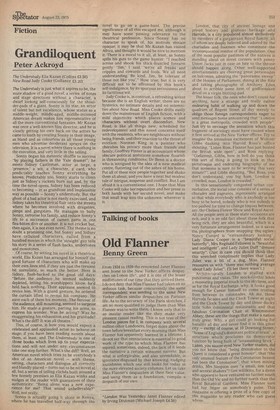Fiction
Grandiloquent
Peter Ackroyd
The Understudy Elia Kazan (Collins £3.50) New Road Judy Cooke (Gollancz £3.20) The Understudy is just what it aspires to be, the mute shadow of a good novel, a series of notes and stage directions without a character, a dwarf looking self-consciously for the shoulder-pads of a giant. Sonny is its star, an actor of talent but not excellence, whose status as a middle-weight, middle-aged, middle-incomed American dream makes him representative of all the more conventional fantasies. Mr Kazan
was once a well-known film director, and he is ,clearly getting his own back on the actors he
came to loath by creating Sonny in their image, as bland and as colourless as all those young men who advertise deoderant sprays on the television. It is a novel where there is nothing in the execution, and very little in the telling.
Sonny began his meteoric shuffle to success "by playing fathers in the Yale dramat"; he meets Sidney Castleman, actor at large, a 'presence,' a wit, a character, a card, who predictably teaches Sonny everything he knows. Predictably too, Sonny starts to climb just as Sidney's rockets burn out and, by the time the novel opens, Sidney has been reduced to becoming — in as grandiose and implausible way as possible — Sonny's understudy. But the ghost of a bad actor is not easily exorcised, and Sidney takes his theatrical flair onto the streets where he becomes involved with drugsters, pimps and gangsters. He manages to bully Sonny, terrorise his family, and reduce Sonny's life to a succession of cameo parts in one flea-bitten dive or another. It is not cricket but, then again, it is not even novel. The theme is no doubt a promising one, but Sonny and Sidney have celluloid characters, culled from a hundred movies in which the 'straight' guy tells his story in a series of flash-backs, undertones and monotones.
Of course, by setting his novel in a theatrical world, Elia Kazan has arranged for himself the good fortune of characters who will make up their own lines and, if they are just the teeniest bit unrealistic, so much the better. Here is Sidney, flash-backed to the good old days: "Before the audience he seemed suddenly depleted, letting his worshippers know he'd held back nothing. Their applause seemed to revive him, With a grand gesture, he ordered the curtain lifted to reveal his company. He gave each of them his moment. The fervour of the audience, still mounting, seemed to surprise him. He made a gesture, parting his arms, to express his wonder. Was he acting? Was he exaggerating his exhaustion and his gratitude? What's the diff? It was all theatre."
This, of course, is how you would expect a celebrated and applauded actor to behave on stage; if you have been reading novels about them, at least; and The Understudy is one of those books which lives up to your expecta tions and will not under any circumstances take one step further. What's the cliff? Well, an American novel which tries to be everybody's idea of an American novel — with theme, setting, characters and dialogue all correctly and blandly placed — turns out to be no novel at
all, but a series of telling diet-16s built around a few homely premises as Elia Kazan winks and nudges at the reader with guarantees of their authenticity: "Being alone was a new experience for me? That sound unbelievable?". Weil, not really.
Sonny is actually going it alone in Kenya, where he has travelled half-way through the novel to go on a game-hunt. The precise significance of all this escaped me, although it may have some passing relevance to the theatrical profession. Since 'Sonny has no character to speak of, his motives remain opaque; it may be that Mr Kazan has visited Africa, and thought it would be nice to mention it. There is a moral to it all, at least, as Sonny spills his guts to the game hunter: "I reached across and shook his thickAuscled forearm gently. 'Jim,' I said, 'we're all freaks and cripples and cowards and fools. We all need understanding. Be kind, Jim, be tolerant of those not like you'." How true; but it is very difficult not to be affronted by this book's self-indulgence, by its spurious seriousness and its factitious wit.
Judy Cooke is, in contrast, a refreshing Writer because she is an English writer; there are no hysterics, no intimate details and no solemnities about New Road, Miss Cooke drifts easily down the mainstream of English fiction, with a mild objectivity which places scenes and characters without overt discomfort. New Road, is like all things new, scheduled for redevelopment and this novel concerns itself with the residents, who are neighbours without being friends, and their reaction to the threat of ; eviction. Norman King is a painter who cherishes his privacy more than friends and family; Geoffrey Pinner is an accountant whose obscure political ambitions somehow flourish in threatening conditions; Dr Benn is a doctor who is intrigued by the idea of a new medical centre, fluttering out of the ashes of his home. Put all of these nice people together and shake them all about, and you have a neat but modest tale of intrigue, suspense and conflict. But I am afraid it is a conventional one. I hope that Miss Cooke will take her reputation and her prose in both hands with her second novel, and make that small leap into the unknown: wherever it is


































 Previous page
Previous page